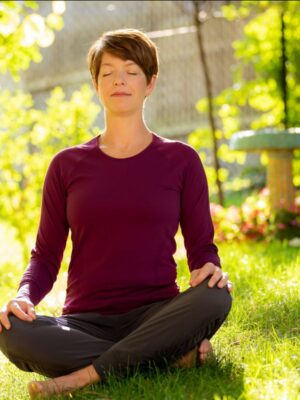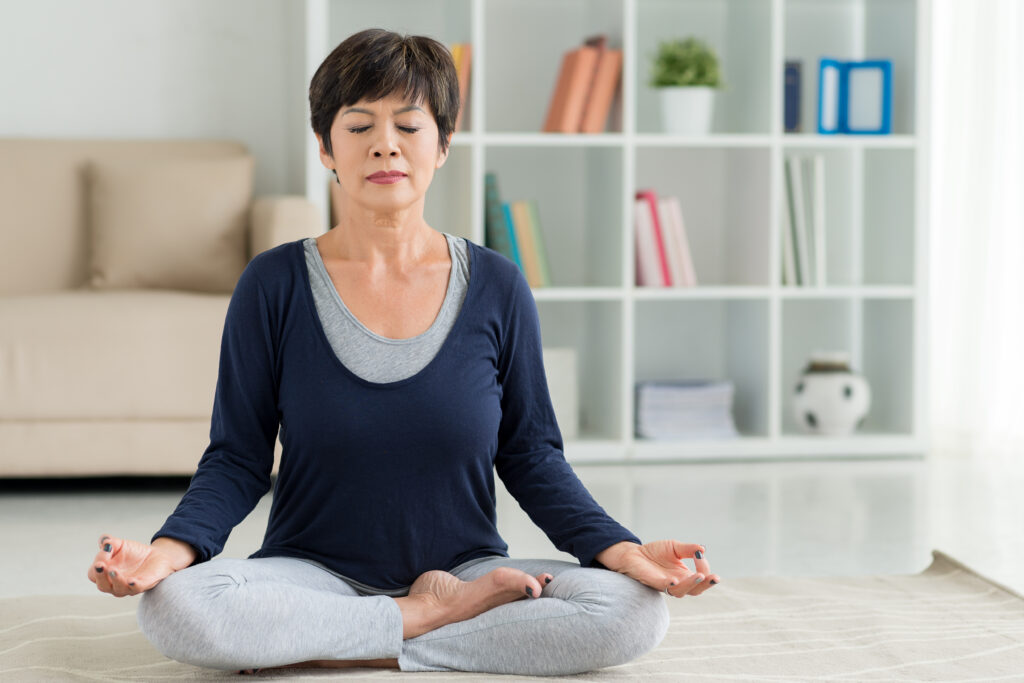Early on when I was starting to practice and teach yoga, I met many experienced yogis who incorporated meditation into their life as a daily habit. As I continued on my own personal spiritual journey, I began to get a little more curious as to why meditation was so important. I began to listen to meditation teachers and read books, and I dabbled with a home meditation practice.
Most of the time, I enjoy a guided meditation. It offers a place for my mind to rest and focus. I listen to someone else telling me what to do to feel calm and at peace. When I finish, I feel good that I accomplished something for my mental health. But over the past 20+ years of teaching yoga, a daily meditation practice has not stuck. I find myself making time to sit and meditate when life is going well and it is easy to make time in the morning for self-care. But as soon as life gets challenging, my meditation practice is usually one of the first things to go.

I share this because I understand how hard it can be to commit to even something that research has proven to help our overall health and well-being. However, as some major life disruptions have happened this past year to me, I have started to get even more curious about the power of meditation and what meditation teachers call, “witnessing mind.”
The Inner Witness
One of the main benefits of meditation and turning the mind inward is the ability to mindfully witness thoughts, feelings, and emotions. Tara Brach calls this our superpower. Mindful witnessing is having the ability to know that you are aware of being aware. You become a neutral observer of your own life. The witness place inside you is simple awareness, the part of you that is aware of everything.

When we are not mindful, we can easily get caught up in fear-based activities and tell ourselves that what we are thinking or feeling is our complete reality. As soon as we remember that our thoughts give us perspective, we can choose which thoughts to pay attention to. It doesn’t mean that you don’t feel anger or hurt. The witness reminds us that these are just thoughts. We don’t have to dwell on them.
Our gateway to a deeper sense of peace, freedom, and joy is understanding that you are more than your thoughts and emotions. The ability to witness without judgment allows you to respond from the heart and enriches your spiritual life helping your thinking-mind to gain clarity and confidence.
The witness inside of you is simple awareness, the part of you that is aware of everything – just noticing, watching, not judging, just being present, begin here now. The witness coexists alongside your normal consciousness as another layer of awareness, as the part of you that is awakening. – Ram Das
The Process of Witnessing
In meditation, your awareness is given a place from which to observe the mind’s activity. It can mean concentrating on the breath, a mantra, or listening to a teacher guide you through a practice. A teacher may instruct you to “let your thoughts be like clouds passing by in a blue sky. When you look up at the sky, you will notice clouds are a part of the sky, but they are not the sky. You can focus all of your awareness on a cloud, or you can expand your awareness and observe the clouds passing by as you enjoy the beauty and peacefulness of a calm, blue sky.

You can use this analogy during meditation. Allow your thoughts to be like clouds. They come into your consciousness, but you do not have to choose to focus your attention on the thoughts or feelings. You can simply let them pass through your awareness and return to witnessing the mind.
A Simple Practice
You can awaken the witness by pausing right here where you are. Invite your attention to go inward.
- What is happening inside of you right now? Notice the sensations in your body, your feelings, thoughts, and emotions. What are you bringing to this present moment?
- As you notice, can you let it all be? Can you observe with a kind presence, refraining from judgment?
- Relax your effort and rest for a few moments connecting to your inner witness.
If you would like to be guided through a witnessing mind meditation, click on this link and spend 10 minutes witnessing your sensations, thoughts, and feelings in this present moment as I guide you through this meditation practice on my Resilience & Grace podcast.
https://www.buzzsprout.com/580711/10999396-witnessing-your-thoughts.mp3?download=true
My Journey
As I reflect on my current and past meditation journey, I am more aware of my tendencies and habits. Instead of meditating when it is easy, I am currently dedicated to making time to meditate and cultivatea stronger inner witness. I also give myself grace when I don’t “sit” for meditation. I can pause where I am in any moment and expand my awareness, witnessing how I am doing so I can respond, instead of reacting to situations throughout my day. Making time to meditate strengthens my ability to pause and not let my thoughts and feelings define my reality as good or bad. As difficult as it is to prioritize the time to meditate, devoting even a small chunk of time to this practice has made a significant difference in my life.

